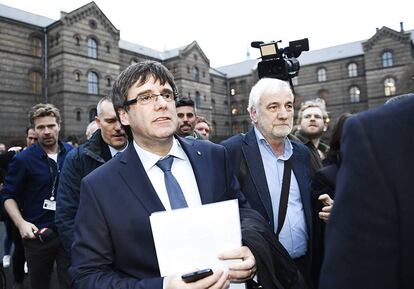Spanish prosecutors to supply Germany with more evidence against Catalan ex-premier
The meeting with German legal representatives is aimed at finding ways to ensure Carles Puigdemont is extradited back to Spain in order to face charges of rebellion
Spanish and German public prosecutors are planning to hold a discreet meeting in the next few hours in The Hague with the aim of exchanging information about the ousted Catalan premier Carles Puigdemont. They will be discussing whether it is possible to incorporate new evidence in order for Spain’s European arrest warrant against the politician for the offenses of rebellion and sedition to prosper.

Puigdemont fled from Spain late last year, after a unilateral declaration of independence was passed in the Catalan parliament. He initially took refuge in Belgium, but last month he was arrested in Germany after entering the country from Denmark. He was held in custody until a regional court in Schleswig-Holstein ruled that there was insufficient evidence to extradite Puigdemont for the offense of rebellion, despite the fact that German prosecutors supported this move. He has been released on bail while the evidence against him for the lesser charge of misuse of public funds is examined.
According to legal sources, the meeting today will take place at the headquarters of Eurojust, the branch of the European Union that is in charge of strengthening juridical cooperation between member states. At the meeting will be Spanish prosecutors involved in the Supreme Court case against Puigdemont, as well as counterparts from the Schleswig-Holstein region of Germany, where a regional court that is hierarchically on a lower rung that the Spanish Supreme Court has blocked the possibility of trying the former premier for rebellion.
At the meeting will be official representatives who are dealing with the investigative stage of the Supreme Court case against Puigdemont
The aim of the meeting is to try to demonstrate to the German prosecutors that there is indeed sufficient evidence to justify Puigdemont’s extradition on rebellion and sedition charges. While the German prosecutors cannot file an appeal to overturn the decision made by the regional judge, there are two paths being explored. One is for the German prosecutors to call on the Schleswig-Holstein court to reconsider its decision on the basis of new evidence supplied by Spain. And the other is for the court, should it have doubts about what to do, to seek advice from the European Union Court of Justice.
Spanish prosecutors will show the Germans proof and arguments relating to charges of rebellion and misuse of funds – the Interior Ministry has documented at least 300 violent acts during the disturbances connected to the pro-independence drive in Catalonia. The German court will have to decide whether these offenses have an equivalent under local law.
Once the German court has analyzed the new, more detailed evidence from Spain, it will have to report on the “handover conditions” for Puigdemont. If these include a veto on trying the former premier for rebellion back in Spain, Supreme Court Judge Pablo Llarena, who is in charge of this stage of the case, will himself turn to the EU Court of Justice.
Spanish prosecutors will show the Germans proof and arguments relating to charges of rebellion and misuse of funds
Sources say that Llarena will ask the court whether the Schleswig-Holstein judges have correctly interpreted the laws surrounding European arrest warrants. Other such orders issued by the judge to Belgium and Scotland, where five other former Catalan regional ministers have fled (two more are in Switzerland, where the extradition system is different), would then be suspended until the court in Luxembourg ruled on the request, a process that could take around three months if fast-tracked.
Germany usually issues around double the number of European arrest warrants to Spain as Spain issues to Germany, given that the Spanish coasts are a regular refuge for European criminals.
English version by Simon Hunter.
Tu suscripción se está usando en otro dispositivo
¿Quieres añadir otro usuario a tu suscripción?
Si continúas leyendo en este dispositivo, no se podrá leer en el otro.
FlechaTu suscripción se está usando en otro dispositivo y solo puedes acceder a EL PAÍS desde un dispositivo a la vez.
Si quieres compartir tu cuenta, cambia tu suscripción a la modalidad Premium, así podrás añadir otro usuario. Cada uno accederá con su propia cuenta de email, lo que os permitirá personalizar vuestra experiencia en EL PAÍS.
¿Tienes una suscripción de empresa? Accede aquí para contratar más cuentas.
En el caso de no saber quién está usando tu cuenta, te recomendamos cambiar tu contraseña aquí.
Si decides continuar compartiendo tu cuenta, este mensaje se mostrará en tu dispositivo y en el de la otra persona que está usando tu cuenta de forma indefinida, afectando a tu experiencia de lectura. Puedes consultar aquí los términos y condiciones de la suscripción digital.








































